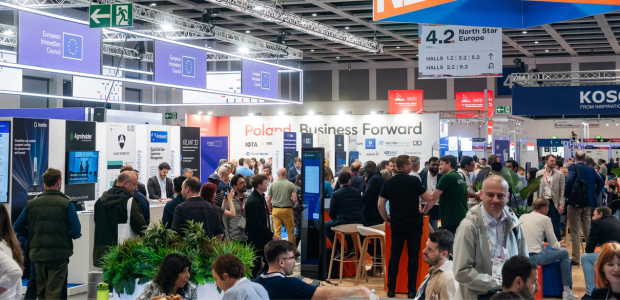
New Study Reveals the Blueprint for European Digital Sovereignty
A new whitepaper released by Europe’s leading tech, startup and digital investment event, GITEX AI EUROPE, in partnership with research firm - LUE, maps out the foundations for Europe’s digital sovereignty; identifying the imperatives that could define the continent’s next decade of technological leadership.
With Europe’s ICT market now valued at €1.02 trillion1, the study emphasises that Europe’s long-term tech competitiveness hinges on its ability to scale AI computing power, establish cloud infrastructure, embed open-source standards, and mobilise deeper pools of startup capital. Together, these priorities form the pillars of a ‘new industrial compact’ aligning Europe’s innovation capacity with its economic and energy growth.
Compute as the New Industrial Power
While Europe’s data centre capacity is set to grow by 70% by 2030, the report highlights that demand from AI applications is set to rise even faster. To keep pace, Europe must expand both its computing and energy infrastructure in tandem. Germany alone may need to triple its data centre capacity by the end of the decade, requiring up to €60 billion in new investment to meet the projected industrial and AI workloads.
Initiatives such as the EU’s €200 billion InvestAI programme, which funds five AI gigafactories across Europe, are already anchoring this effort. These data centres will be equipped with 100,000 or more specialised chips (GPUs), with access open to large industrial companies as well as startups and research institutes.
The report notes that such expansions must evolve alongside clean energy integration to ensure resilience and sustainability, effectively strengthening the link between digital sovereignty and Europe’s energy transition.
Sovereign Cloud, Not Cloud Dependency
Cloud autonomy emerges as the second frontier. Today, around 40% of European enterprises have at least 40% of their applications hosted in the cloud, a figure expected to soar to 91% by 2028. Yet non-European hyperscalers control roughly 70% of the continent’s cloud market.
The paper calls for a shift toward “sovereign-first” cloud architectures that guarantee operational, legal, and data control within European jurisdictions. The goal isn’t to isolate, but to enable transparency, auditability, and innovation freedom under European standards.
Open Source as Europe’s Edge
The study identifies open source-based cloud technologies as a pivotal force in reinforcing sovereignty. Cloud solutions that are based on open-source software, typically developed by global developer communities, offer new levels of transparency, flexibility, and independence from proprietary vendors.
Open standards such as the Sovereign Cloud Stack (SCS), funded by the German Federal Ministry for Economic Affairs and Climate Action, enable companies to build and migrate freely across platforms, fostering a culture of shared innovation. In essence, open source allows Europe to innovate collaboratively while remaining in control of its digital foundations.
Backing Europe’s Deep-Tech Builders
Ultimately, sovereignty is sustained not only by infrastructure but by investment. Despite Europe’s rich engineering talent, only around 5% of global venture capital flows into the EU tech ecosystem, according to the Bertelsmann Foundation.
Closing that gap is crucial. The whitepaper calls for a new ecosystem of growth-stage financing, powered by public-private co-investment and strategic industrial funds, to ensure that Europe’s brightest deep-tech startups, from AI and cloud to semiconductors, can scale globally without migrating abroad.
Governments and institutions are creating new financial scaffolding: from Germany’s KfW DeepTech Future Fund (€1 billion) backing high-growth innovators to the Important Project of Common European Interest (IPCEI) on Next-Generation Cloud and Services, which channels €3 billion into EU-based data and semiconductor projects.
The whitepaper concludes that Europe’s digital sovereignty will be achieved through policy and coordinated execution, in partnership with global stakeholders. Sovereignty isn’t solitude; it’s about building systems that are open by design and secure by default.
GITEX AI EUROPE 2026 Rallies Global Tech Partnerships
Organised by KAOUN International, and endorsed by the Berlin Senate Department for Economics, Energy and Public Enterprises, and Berlin Partner for Business and Technology, GITEX AI EUROPE launched earlier this year as the continent’s largest tech, startup, and digital investment debut event, convening over 1,400 enterprises and startups from more than 34 European states and 100 countries.
The 2026 edition, running from 30th June to 1st July 2026 at Messe Berlin, continues to serve as the defining nexus for Europe’s digital future - connecting AI, deep tech, quantum, cyber and cloud innovators, policymakers, and investors in a collective pursuit of open, bold, and collaborative technological leadership.
GITEX AI EUROPE is part of the GITEX global network of tech and startup events, taking place in Abu Dhabi, Dubai, Brazil, Egypt, Germany, Kazakhstan, Kenya, Morocco, Nigeria, Serbia, Singapore, Türkiye, and Vietnam. For more information, please visit: www.gitexeurope.com.
Access the full whitepaper here: https://event.gitexeurope.com/GE26-whitepaper2026

